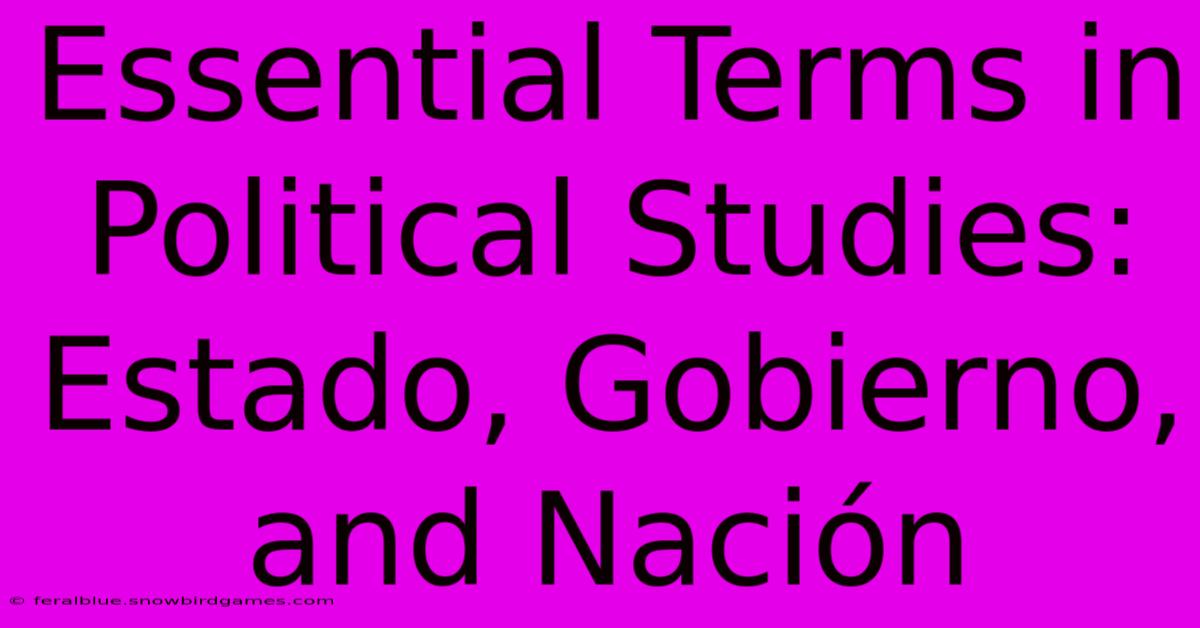Essential Terms In Political Studies: Estado, Gobierno, And Nación

Table of Contents
Essential Terms in Political Studies: Estado, Gobierno, and Nación
Understanding the nuances of political systems requires grasping key concepts. In the Spanish-speaking world, and indeed across much of political science, the terms Estado, Gobierno, and Nación are frequently used, often interchangeably but with distinct meanings. This article clarifies the differences and explores their interconnectedness.
What is the Estado?
The term Estado, often translated as "state," refers to the permanent, sovereign entity that exercises authority over a defined territory and population. It encompasses the entire apparatus of government, including its institutions, laws, and administrative structures. Think of the Estado as the overall framework – the enduring entity that exists regardless of who holds political power at any given time. Its key characteristics include:
- Sovereignty: The Estado holds supreme authority within its borders, free from external interference.
- Territory: It controls a specific geographical area.
- Population: It governs a defined group of people residing within its territory.
- Monopoly on legitimate force: The Estado possesses the right to use force (e.g., police, military) to maintain order and enforce its laws.
- Legitimacy: The Estado's authority is generally accepted by its population, although the degree of legitimacy can vary significantly.
Examples of Estado Functions:
- Providing public services: Education, healthcare, infrastructure.
- Enforcing laws and maintaining order: Police, courts, prisons.
- Conducting foreign relations: Diplomacy, treaties, international organizations.
- Collecting taxes: Funding government operations.
Understanding Gobierno: The Government
Gobierno, often translated as "government," represents the group of people who exercise political power within the Estado at a specific point in time. It's the administrative body responsible for implementing the laws and policies of the Estado. Unlike the enduring Estado, the Gobierno is temporary; it changes with elections or other shifts in power.
Key distinctions between Estado and Gobierno:
- Permanence vs. Temporality: The Estado is permanent; the Gobierno is temporary.
- Structure vs. Personnel: The Estado is the structure; the Gobierno is the personnel.
- Authority vs. Power: The Estado holds authority; the Gobierno exercises power.
Exploring the Nación: The Nation
Nación, often translated as "nation," is more complex. It refers to a group of people who share a common identity, often based on factors such as language, culture, history, or ethnicity. This shared identity creates a sense of belonging and collective consciousness. Crucially, a Nación doesn't necessarily coincide with the territory or political boundaries of an Estado.
Key characteristics of a Nación:
- Shared identity: A sense of collective belonging.
- Common culture: Shared values, beliefs, and traditions.
- National consciousness: Awareness of belonging to a distinct group.
- Aspirations for self-determination: The desire to govern oneself.
The Relationship Between Estado, Gobierno, and Nación:
The ideal situation is a harmonious relationship where the Estado represents the Nación, and the Gobierno effectively governs on behalf of the Nación's interests. However, in reality, this ideal is rarely perfectly achieved. There can be significant tensions between the Estado and the Nación, particularly in multinational states where different national groups coexist within a single Estado. Similarly, a Gobierno might not always act in the best interests of the Nación.
Conclusion:
Differentiating between Estado, Gobierno, and Nación is vital for understanding political systems and dynamics. These concepts are interconnected but distinct, offering a sophisticated framework for analyzing power, authority, and national identity. By grasping the nuances of these terms, we can better navigate the complexities of political discourse and analysis.

Thank you for visiting our website wich cover about Essential Terms In Political Studies: Estado, Gobierno, And Nación. We hope the information provided has been useful to you. Feel free to contact us if you have any questions or need further assistance. See you next time and dont miss to bookmark.
Featured Posts
-
Jay Shahs Age A Public Figures Private Life
Apr 03, 2025
-
Dr Umars Daughter Her Charitable Contributions
Apr 03, 2025
-
Unforgettable Birthday Wishes For My Daughter
Apr 03, 2025
-
Dragon Age Veilguard Mastering The Games Mechanics
Apr 03, 2025
-
Kim Sae Ron Age More Than Just A Birthdate
Apr 03, 2025
